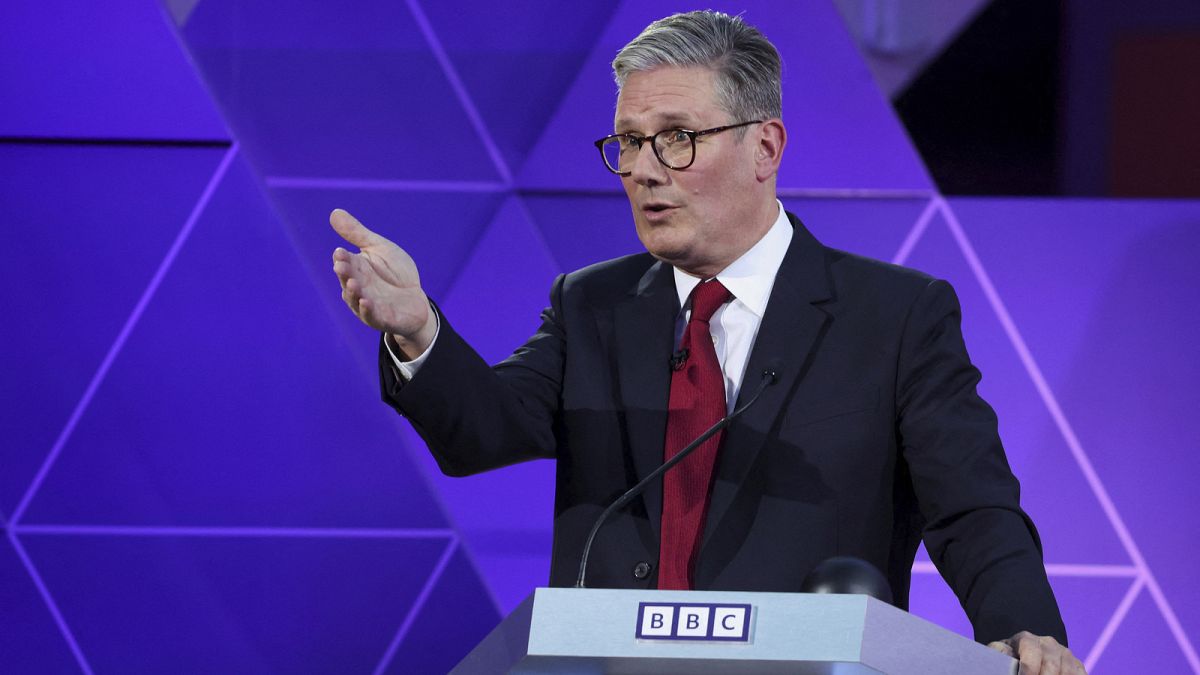The Labour leader says he wants to secure a better deal with the EU on trade, R&D as well as security and defence.
Labour leader Keir Starmer has vowed to “get a better deal on trade relations with the EU” if he becomes prime minister in next week’s UK general election.
“I do not accept that we can’t get a better deal than the one that we’ve got,” Starmer said during a BBC head-to-head debate with Prime Minister Rishi Sunak on Wednesday evening, presented by Michal Husain.
“I’m going to go back into the EU. I’m going to fight for a better deal so you can trade more easily,” he added, responding to a question from the audience about how the candidates would restore the UK’s ability to trade freely.
The UK formally exited the EU and its single market on 31 December 2020 after an agreement was struck by then-prime minister Boris Johnson, a move many British businesses claim has added red tape and curbed their ability to trade freely with clients on the continent.
“I think Boris Johnson botched it,” Starmer said in Wednesday’s debate.
Despite campaigning to remain in the European Union, Starmer has clearly said he will not seek to re-join the bloc or its single market if he is handed the keys to 10 Downing Street when the United Kingdom heads to the polls on July 4.
He has however promised to seek closer EU ties, with his Shadow Chancellor Rachel Reeves recently suggesting she would seek improved terms for the UK’s post-Brexit deal with the EU – known as the Trade and Cooperation Agreement – in areas such as chemical regulation and financial services.
In response to Starmer’s claim, Prime Minister Rishi Sunak – whose Conservative party is trailing some 20 percentage points behind the Labour party in the polls – claimed the EU could only grant better trading terms to the UK if it allowed EU citizens to move freely across its borders.
“You might be able to (negotiate a better deal), but do you know what the price of it will be? It will be free movement of people,” Sunak said. “All the things he’s talking about involves accepting more migrants, free movement by the back door.”
Sunak also hailed his own successes in negotiating the UK’s re-entry into the EU’s €95.5 billion Horizon research programme. The deal, struck last September, means British scientists can once more benefit from EU funding and collaborate more closely with their European counterparts.
But Starmer said more could be done to tighten ties between the EU and the UK on research and development, as well as in the field of security and defence.
While Brexit and its impact on the UK have not featured prominently on the campaign trail ahead of the July 4 vote, Starmer has adopted a notably more conciliatory stance on EU relations compared to his Conservative rival.
Rishi Sunak has nonetheless fostered warm relations with EU leaders such as European Commission President Ursula von der Leyen, notably by striking a deal on the Windsor Framework in February last year.
The agreement has provided more certainty on the checks needed on goods moving from Great Britain to Northern Ireland and contributed to restoring political stability in Belfast.
But Starmer’s commitment to re-opening the post-Brexit Trade and Cooperation Agreement would spell a new chapter in the EU-UK relationship, which has recently recovered after a turbulent period of negotiations on the terms of the UK’s exit.

